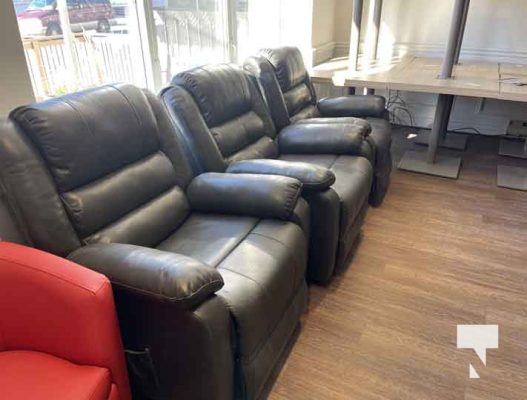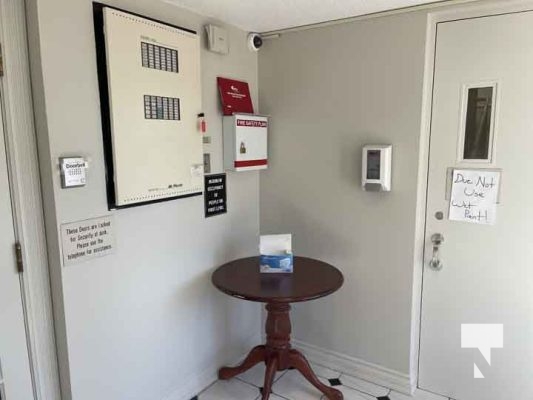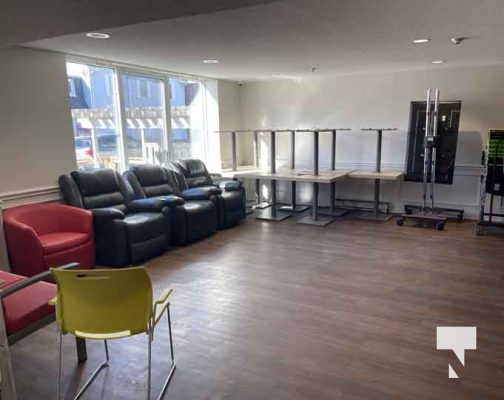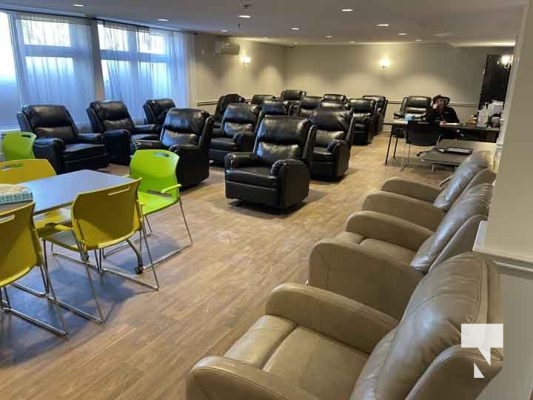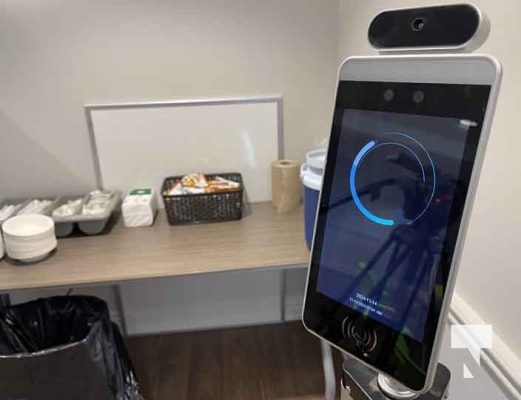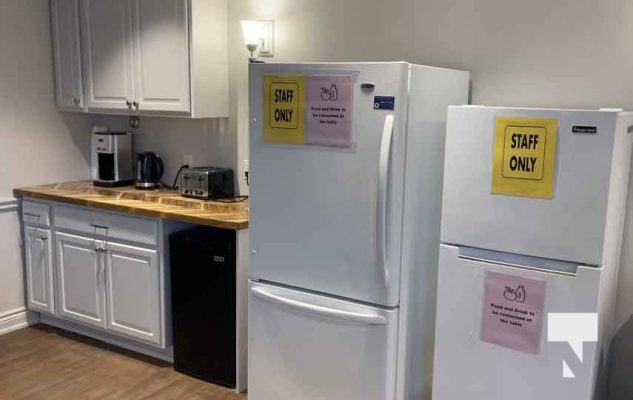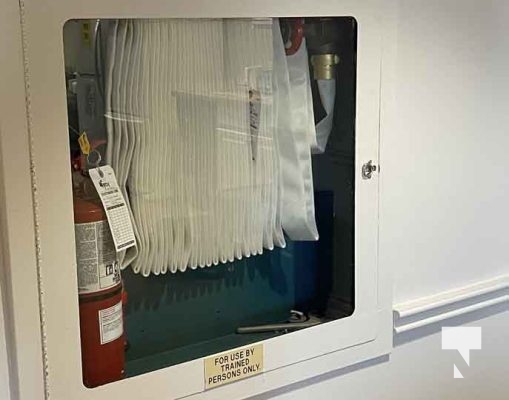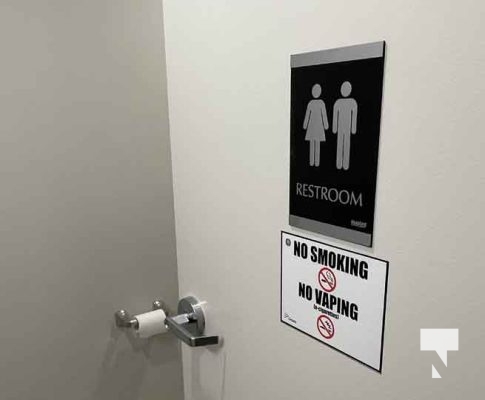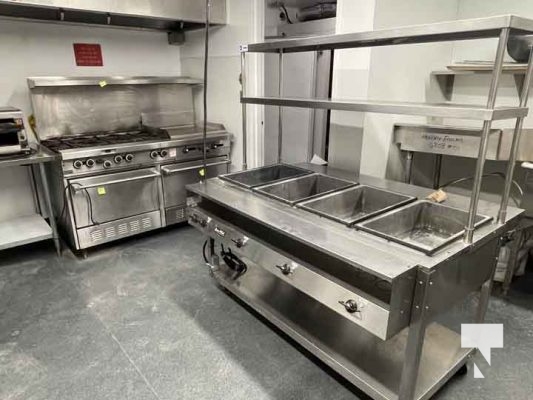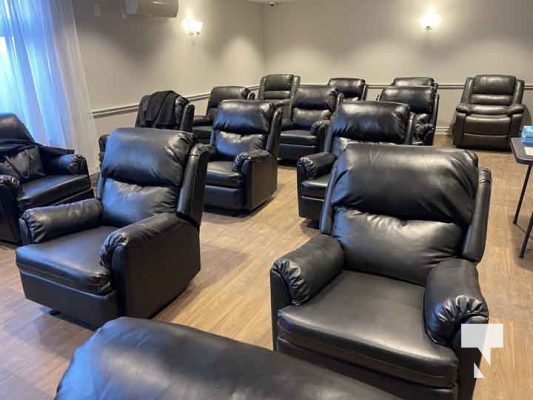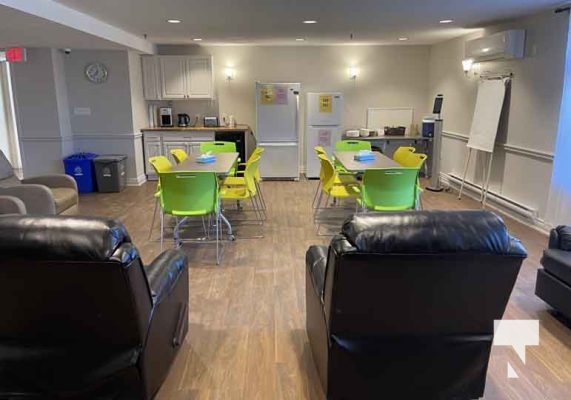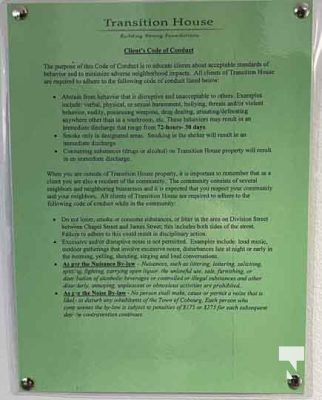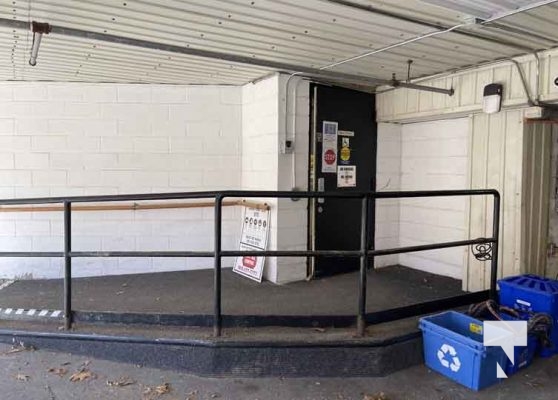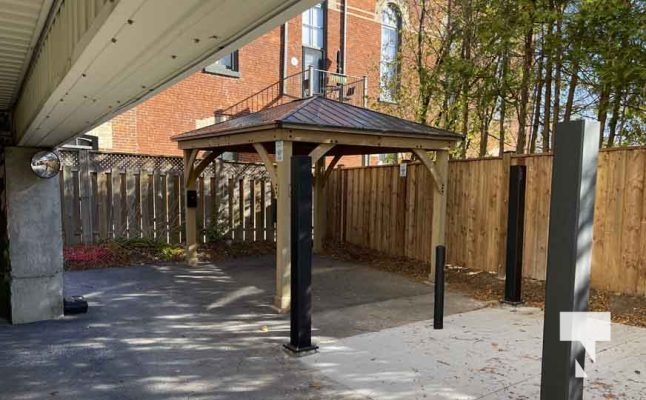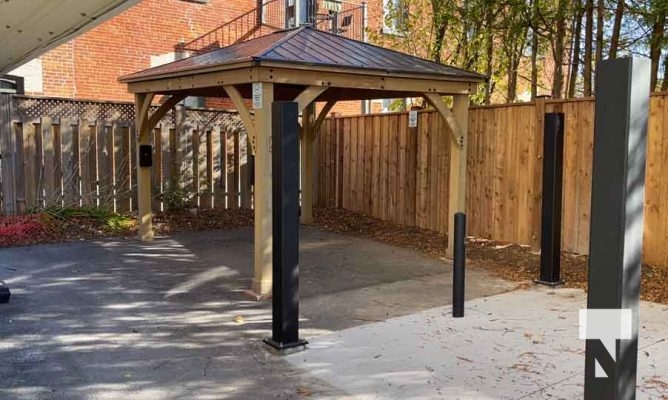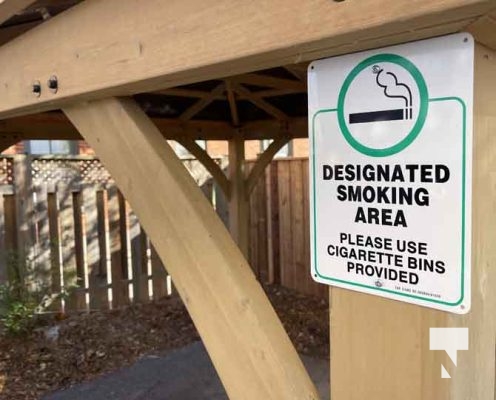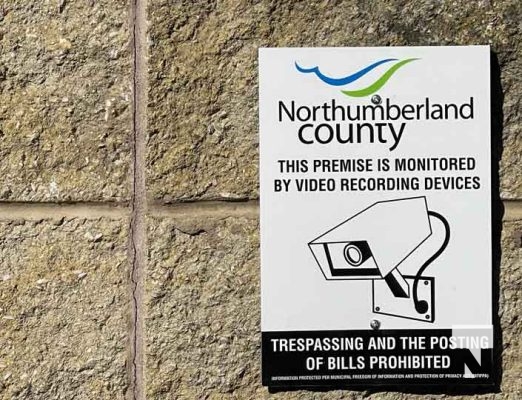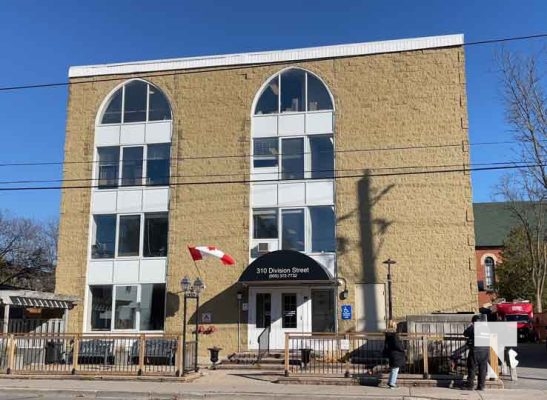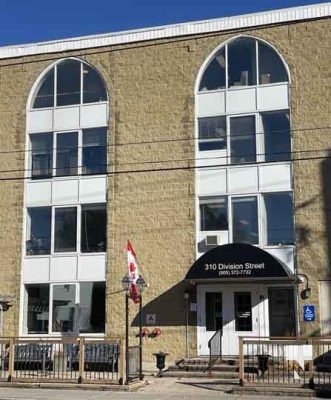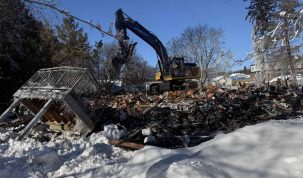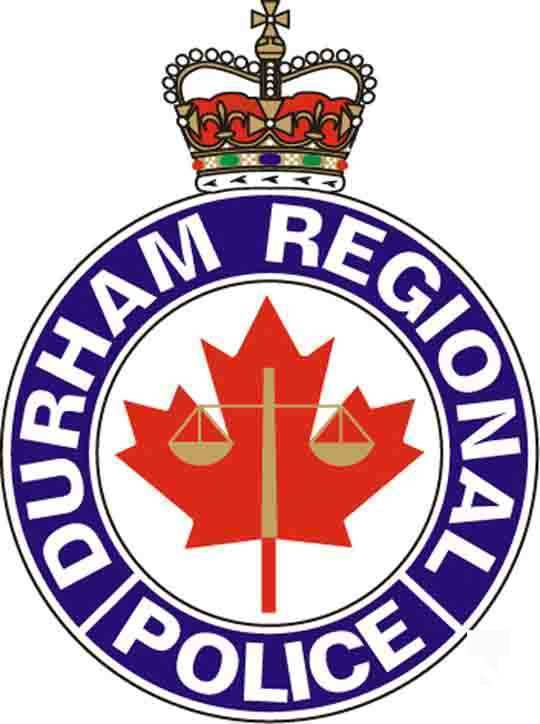By Cecilia Nasmith/Northumberland 89.7 FM/Today’s Northumberland
The door opens at 6 p.m. Wednesday, Nov. 13, on a Northumberland County facility at 310 Division St., Cobourg, that offers the homeless community a 24/7 warming hub, a drop-in centre, laundry and shower facilities and, eventually, even more.
After protracted negotiations between the Town of Cobourg (which passed an Emergency Care Establishments bylaw) and Northumberland County (which purchased the facility with plans to expand its homelessness-shelter capacity), the county announced Tuesday evening that compliance with the bylaw had been achieved and licensing granted.
At noon Wednesday, members of the local news media got a tour.
Transition House Client Services Manager Mirri Lawrence, who is often on the premises as services shift there from the smaller 10 Chapel St. location, pointed to the sign limiting occupancy to 50. That still leaves room for plenty of new loungers, she said, and the tables in the snack corner that promote more of a community feeling.
There’s a row of lockers opposite the snack corner, and new washers and dryers next to the two-piece bathroom with a TV to come. And just off the lobby, Northumberland County Homelessness Services Manager Bill Smith pointed out the large, accessible bathroom with a walk-in shower.
If he had to pinpoint three barriers to people taking advantage of shelter space, Smith said a big one would be accessibility. If you add in the fact that the new facility allows a homeless person to bring along his or her partner and/or pet, that addresses all three barriers, making it a low-barrier shelter.
The term may not be familiar to some, he added, but “low-barrier” basically means creating higher access.
“It’s a drop-in space where people can come just to get off the street, do a bit of laundry or just some needed respite from the weather. There’s always staff around to answer any questions.”
Best practices for staffing shelter systems call for one staffer per 20 people, he added, and they are aiming for one staffer per 10.
“It’s better service for the clients, and for the community.”
The lobby space will soon have actual work stations for these staff members, where they can navigate the system to help individuals with whatever barriers they are facing on their journey through homelessness.
Smith was delighted to show off their industrial kitchen, not just for its ability to provide meals but the training and entrepreneurial opportunities it may provide for clients of 310 Division – and potentially for members of the community – with its walk-in freezer and refrigerator, warming oven and full stove.
Smith said the building, formerly the Cobourg Retirement Residence, became vacant last fall and was purchased in December. Construction began shortly thereafter, with such updates as LED lighting.
It was always envisioned that much of the work the county does toward addressing homelessness would take place here. Eleven service providers have agreed to come in and provide services. The list includes such agencies as Community Paramedics, CMHA and the Help Centre, who will be on site and remove the necessity of clients somehow finding transportation to get help. And, of course, county staff members will always be available.
Members of the media asked about what was expected in return. For example, no drug use will be permitted.
“This is not a safe injection site,” Smith said.
“If they are currently using, they have to go off.”
There is a smoking area, but it’s not out front – it’s the gazebo at the back of the driveway.
The outside area will be monitored for garbage frequently, and guests will not be permitted in the upstairs rooms – though transitional housing occupants will have that privilege. The single elevator is within sight of staff in the lobby area, who will keep an eye on things.
The road to getting a license from the Town of Cobourg with its Emergency Care Establishments bylaw has not been smooth but as time went on, Smith said, both sides recognized that another winter was coming and solutions had to be found. In the end, the license was granted, he said, and would be on the wall before the 6 p.m. opening.
And it’s all only the beginning. By year’s end, they hope to have 35 upstairs spaces ready for use, each with a private bathroom, with common space and private rooms to allow meetings with clients also located upstairs.
In the new year, the fourth floor will be ready for use with 10 transitional-housing units. These include kitchenettes, and are available through an application process. This is where clients will take responsibility for their own living quarters (garbage disposal, cleaning and so on) as they prepare to move into more permanent housing as soon as it is available.
Transition House – Client’s Code of Conduct
The purpose of this Code of Conduct is to educate clients about acceptable standards of behavior and to minimize adverse neighborhood impacts. All clients of Transition House are required to adhere to the following code of conduct listed below:
• Abstain from behavior that is disruptive and unacceptable to others. Examples include: verbal, physical, or sexual harassment, bullying, threats and/or violent behavior, nudity, possessing weapons, drug dealing, urinating/defecating anywhere other than in a washroom, etc. These behaviors may result in an immediate discharge that range from 72-hours- 30 days.
• Smoke only in designated areas. Smoking in the shelter will result in an immediate discharge.
• Consuming substances (drugs or alcohol) on Transition House property will result in an immediate discharge.
When you are outside of Transition House property, it is important to remember that as a client you are also a resident of the community. The community consists of several neighbors and neighboring businesses and it is expected that you respect your community and your neighbors. All clients of Transition House are required to adhere to the following code of conduct while in the community:
• Do not loiter, smoke or consume substances, or litter in the area on Division Street between Chapel Street and James Street; this includes both sides of the street.
Failure to adhere to this could result in disciplinary action.
• Excessive and/or disruptive noise is not permitted. Examples include: loud music, outdoor gatherings that involve excessive noise, disturbances late at night or early in the morning, yelling, shouting, singing and loud conversations.
• As per the Nuisance By-law – Nuisances, such as littering, loitering, soliciting, spitting, fighting, carrying open liquor, the unlawful use, sale, furnishing, or distribution of alcoholic beverages or controlled or illegal substances and other disorderly, annoying, unpleasant or obnoxious activities are prohibited.
• As per the Noise By-law – No person shall make, cause or permit a noise that is likely, to disturb any inhabitants of the Town of Cobourg. Each person who contravenes the by-law is subject to penalties of $175 or $275 for each subsequent day he contravention continues.


